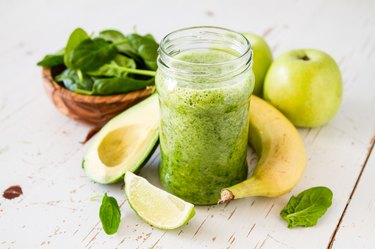
An active lifestyle helps you gain weight by stoking your appetite and building muscle. Resistance training is especially important in helping you to put on lean mass, which is a far healthier way to gain weight than adding just fat. Being active burns calories, though, so it's important to replace them with nutrient-rich foods so you support, rather than undermine, your weight-gain goal. A pre- and post-workout snack or meal provides those calories while also supporting muscle growth and recovery so you can look and feel your best.
Weight Gain and Muscle Growth
Video of the Day
To gain weight, you need to create a calorie surplus. Determine how many calories you burn daily using an online calculator or work with a dietitian. Factor in your level of exercise as well as your size, age and gender. Then, add 250 calories to that number to create the daily calorie amount that will result in a 1/2-pound gain per week. One-half pound is about the maximum amount of muscle you can add per week, so if you gain at a much faster rate, you're likely adding excess body fat. Spread your calorie intake out throughout the day at all meals and snacks, including the ones you consume pre- and post-workout.
Video of the Day
Resistance training supports muscle growth when you're trying to gain weight. If you gain weight while sedentary, two-thirds of every pound you add is in the form of fat. A regular program that gets you working every muscle group at least twice per week with heavy weights promotes muscle growth. A little cardiovascular exercise is also helpful to keep your heart healthy -- aim for 20 to 30 minutes at a moderate pace most days when you're trying to gain pounds.
Pre-Workout Meal Considerations
Eating a snack before you exercise provides you with energy, prevents mid-workout hunger and deters low-blood sugar as you exercise. A pre-workout snack also provides an opportunity to take in healthy calories. A protein-rich option also starts supplying amino acids to worked muscles right away, which helps with hypertrophy -- or muscle growth -- and repair.
A full meal can be too much food just before an intense session, however. It's hard to push, pull and squat when your belly is full of steak and potatoes; you need three to four hours to fully digest a large quantity of food. Even a small meal usually takes a couple hours to process, and can make you uncomfortable during your workout if it's eaten too close to your session.
Although healthy unsaturated fats are calorie dense and support weight gain, eating a large serving of them before working out can upset your stomach. The fat, even when it's found in protein-rich foods such as peanut butter, takes longer to digest than protein and carbohydrates and may make you feel heavy and sluggish. You don't have to avoid fat altogether pre-workout; just minimize your intake.
Planning Food for After Your Workout
The post-workout period is time to replace some of the calories burned during your workout, mainly with a combination of carbohydrates and protein. Carbohydrates help restore the glycogen in your muscles so you recover faster. Protein consumed in the 15 to 60 minutes following a workout provides you with amino acids that your body needs to promote protein synthesis, or muscle growth, as well as assists in repairing muscles. The faster your muscles recover, the sooner you can hit the gym again and provide more stimulation for growth and weight gain.
You need at least 0.55 grams of protein per pound of body weight per day when you're trying to gain muscle, and you should aim for closer to 0.8 grams per pound. Spread this intake out relatively evenly over four or five meals, including the one after your workout. Most people need about 20 to 30 grams of protein post-session.
Pre- and Post-Workout Snack Options
A pre-workout snack should be moderate in size and calories, so as not to overload your system and ruin your training. Combine carbohydrates, for energy, and protein, for amino acids, in just about 200 to 250 calories worth of food. Examples include a couple of scrambled eggs alongside a banana; a few slices of deli turkey with woven-wheat crackers; a scoop of whey protein blended with a banana and milk; or a small bowl of granola with milk.
After a workout, have another 200- to 300-calorie snack or a larger meal, such as a a sweet potato with roasted chicken; canned tuna mixed with mustard in a whole-wheat pita; or salmon with brown rice. None of these are easy to carry in a gym bag, however, so you might prefer a shaker of whey protein with juice or milk and a side of fruit or a cup of Greek yogurt topped with granola.
- Go Ask Alice: Is It Better to Eat Before or After Exercise
- CNN: How Should I Eat to Gain Muscle?
- IDEA Health and Fitness Association: Gaining Weight the Right Way
- McKinley Health Center: Gaining Weight the Healthy Way
- Journal of the International Society of Sports Nutrition: The Effect of Protein Timing on Muscle Strength and Hypertrophy: A Meta-Analysis